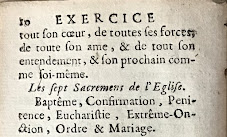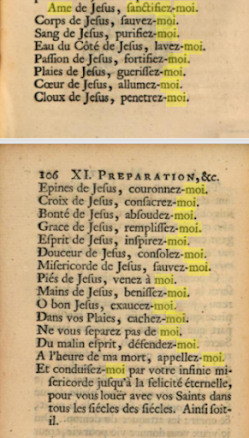
Fotobanka ČTK, René Fluger;, CC BY-SA 3.0
Introduction

Ste Thérèse : a Christmas miracle in 1886
Comment donc osais-je espérer mon entrée prochaine au Carmel? Un petit miracle était nécessaire pour me faire grandir en un moment; et, ce miracle tant désiré, le bon Dieu le fit au jour inoubliable du 25 décembre 1886. En cette fête de Noël, en cette nuit bénie, Jésus, le doux Enfant d'une heure, changea la nuit de mon âme en torrents de lumière. En se rendant faible et petit pour mon amour, il me rendit forte et courageuse; il me revêtit de ses armes, et depuis je marchai de victoire en victoire, commençant pour ainsi dire une course de géant. La source de mes larmes fut tarie et ne s'ouvrit plus que rarement et difficilement.How, then, could I hope soon to be admitted to the Carmel? A miracle on a small scale was needed to give me strength of character all at once, and God worked this long-desired miracle on Christmas Day, 1886. On that blessed night the sweet Infant Jesus, scarce an hour old, filled the darkness of my soul with floods of light. By becoming weak and little, for love of me, He made me strong and brave; He put His own weapons into my hands, so that I went from victory to victory, beginning, if I may say so, "to run as a giant."The fountain of my tears was dried up, and from that time they flowed neither easily nor often.
Claudel : a Christmas Conversion in 1886
 |
| I, Sailko, CC BY-SA 3.0 |
For the rest of his life he recalled that he “stood near the second pillar at the entrance to the chancel, to the right, on the side of the sacristy.” Here stands a fourteenth-century statue of the Virgin and Child. “Then occurred the event which dominates my entire life,” he wrote.
“In an instant, my heart was touched and I believed. I believed with such a strength of adherence, with such an uplifting of my entire being, with such powerful conviction, with such a certainty leaving no room for any kind of doubt, that since then all the books, all the arguments, all the incidents and accidents of a busy life have been unable to shake my faith, nor indeed to affect it in any way.”
The Holy Infant : a Christmas Poem
La cheminée emplie de charbons rougeoyants
Colore le plafond d’un reflet somnolent,
Et l’on n’entend que l’eau qui bout à petit bruit.
Là-haut sur l’étagère, au-dessus des deux lits,
Sous son globe de verre, couronne en tête,
L’une des mains tenant le monde, l’autre prête
À couvrir ces petits qui se confient à elle,
Tout aimable dans sa grande robe solennelle
Et magnifique sous cet énorme chapeau jaune,
L’Enfant Jésus de Prague règne et trône.
Il est tout seul devant le foyer qui l’éclaire
Comme l’hostie cachée au fond du sanctuaire,
L’Enfant-Dieu jusqu’au jour garde ses petits frères.
The world has surely died in chill December’s gloomBut here ‘tis warm, my Lord, within Thy little room!The grate is laden full of coals all red and glowing,Projecting sleepy shapes across the ceiling showing,And nothing can be heard save water’s simmering sound.All high above the beds, upon a shelf He’s found,Within a case of glass, a royal crown He wears,One hand sustains the world; the other, blessing, sharesHis love for little ones who fly to His protection;So lovely in His cloak and solemn in perfection,Magnificent He seems with grand, majestic train:Prague’s Holy Infant here in royalty doth reign.Alone He stands before the fire’s flickering lightJust like the Sacred Host, He hidden is from sight;His little brothers He will guard throughout the night.
Inentendue comme le souffle qui s’exhale,
L’existence éternelle emplit la chambre, égale
À toutes ces pauvres choses innocentes et naïves !
Quand il est avec nous, nul mal ne nous arrive.
On peut dormir, Jésus, notre frère, est ici.
Il est à nous, et toutes ces bonnes choses aussi :
La poupée merveilleuse, et le cheval de bois,
Et le mouton sont là, dans ce coin tous les trois.
Et nous dormons, mais toutes ces bonnes choses sont à nous !
Les rideaux sont tirés… Là-bas, on ne sait où,
Dans la neige et la nuit sonne une espèce d’heure.
L’enfant dans son lit chaud comprend avec bonheur
Qu’il dort et que quelqu’un qui l’aime bien est là,
S’agite un peu, murmure vaguement, sort le bras,
Essaye de se réveiller et ne peut pas.
As silent as a breath when noiselessly exhaled,With His Eternal Life, the chamber is regaledBefitting little ones in all their innocence!His presence is for us ‘gainst evil a defence.With brother Jesus here, ‘tis safe to fall asleep.He’s there for us but more - the gifts He too doth keep:The magic puppet's here, the sheep and wooden horse,All three are kept within a corner, safe of course.We slumber on and yet these things for us are there!The curtains they are drawn: beyond, we know not where,A sort of Hour doth chime in dark and snowy night,All snug and warm the child discerneth with delightThat while he sleeps yet One there is who loves him dear;And murmuring he tries to push his arm out clear,To rouse himself from sleep but, failing... slumbers here.
Notes
 |
| Paul Claudel.1928. Public domain |
One source ("Nuageneuf") dates this poem to 1911.
"François Claudel, grandson of the writer and diplomat Paul Claudel, offers this poem composed by his grandfather in October 1911 and featured in the Figaro in May 1938, taken from Sacred Images in Bohemia. He had offered the poem to him for Christmas, when he was a child."
Prague is not only the city of Jan Hus but also of St John Nepomucene [1] St Wenceslas, [2] and especially of the Infant Jesus who covers the city with His protection.
[1] St John of Nepomuk (or John Nepomucene): 1345 - 1393); a saint of Bohemia (Czech Republic) who was drowned in the Vltava river at the command of Wenceslaus IV of Bohemia. He issaid to have beenthe confessor of the queen of Bohemia and refused to reveal the secrets of the confessional. He is considered the first martyr of the Seal of the Confessional and a protector from floods and drowning.
[2] St Wenceslaus: born 903; died 935. He received a Catholic education from his grandmother, St. Ludmilla. Wenceslaus favoured the Latin rite instead of the old Slavonic. Wenceslaus was murdered by his brother Boleslaw, his body, having been hacked to pieces, was buried at the scene of the crime, but was later translated to the Church of St. Vitus in Prague.





























